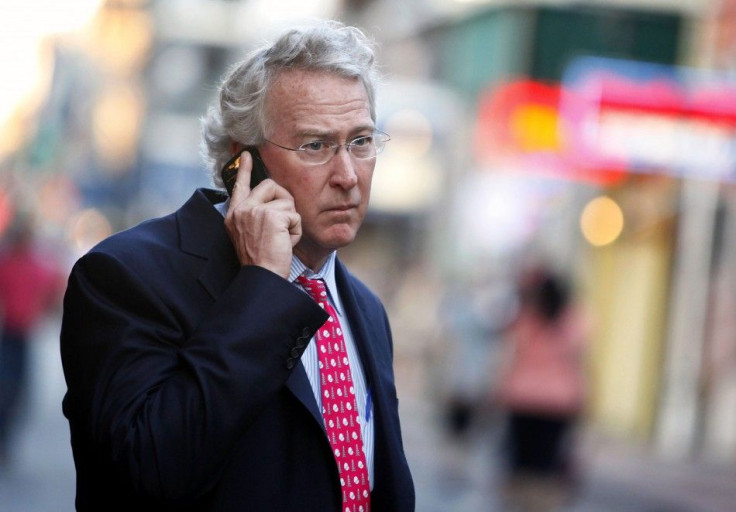Inside Chesapeake, CEO McClendon Ran $200M Hedge Fund: Reuters Investigation

Shares of Chesapeake Energy Corp. (NYSE: CHK), the No. 2 natural gas producer in the U.S., plunged Wednesday after a report that the CEO and co-founder secretly ran a hedge fund that traded in the same commodities that his Oklahoma City company produces.
Reuters reported Tuesday that for at least four years, from 2004 to 2008, Aubrey McClendon ran a lucrative $200 million hedge fund that traded in natural gas without disclosing that activity to investors in Chesapeake Energy, where he ran the company's commodity trading operations.
As the CEO of a major natural gas producer, McClendon presumably would have a unique window into the production of the commodity that he -- through his hedge fund -- was betting either for or against.
McClendon ran the hedge fund at the same time he was directing the company's multibillion dollar energy trading operation and setting its production targets, Reuters said.
The report comes two weeks after Reuters reported that McClendon had taken as much as $1.1 billion in loans against his stakes in Chesapeake oil and gas wells under terms of a now-controversial program that is ended sooner than planned. The report also comes a week after Chesapeake stripped McClendon of the chairmanship and said it is reviewing details of the loans.
A veteran trader who helped run McClendon's private hedge fund told Reuters that McClendon engaged in near daily communications and exhaustive calls to help direct the fund's trading.
The fund, Heritage Management Company LLC, was started by McClendon and Chesapeake co-founder Tom Ward, and its staff included an accountant who was simultaneously employed by Chesapeake. The fund also earned McClendon and Ward management fees and a cut of profits from outside investors.
There is no evidence that McClendon or Ward used inside knowledge gleaned from Chesapeake in their hedge fund trading, Reuters said.
Experts on corporate governance, commodity market regulation and energy trading said they were stunned by the latest revelation.
An executive's first responsibility is to shareholders and the betterment of their investment, Carl Holland, who ran the trading-compliance department at former U.S. oil major Texaco, told the news agency. Personal trading in the commodity around which the CEO's business is based would be a clear no. We would never have tolerated that, ever.
Thomas Mulholland, a risk-management consultant to oil and gas producers for Golden Energy Services in St Louis, said such matters are taken very seriously by energy companies, and there are strict codes against it. Even if there is just a whiff of impropriety, he told Reuters, it can be enough to lead to a termination.
McClendon would have been aware of major decisions that could affect natural gas prices before that information became public.
If the company needs to make an operating decision which might move the market against the CEO's positions, there's a risk that will influence the decision-making at the top of the company, Jeff Harris, former chief economist at the market's U.S. regulator, the Commodity Futures Trading Commission, told Reuters.
Another potential problem is known as front-running. That's when a trader buys or sells a commodity in advance of a client's or his company's orders, the news service said. In theory, McClendon's first-hand knowledge of Chesapeake's trading plans could enable him to profit by trading ahead of Chesapeake -- a move that could raise costs for the company and indirectly expose shareholders to risks.
Advance knowledge of Chesapeake's activities could be perceived as having insight into the movement of commodities prices, which certainly raises conflict-of-interest issues as well as ethical issues about the ability to enrich himself on non-public information, Tim Rezvan, oil and gas industry analyst at Sterne Agee in New York, told Reuters.
If correct, Rezvan said, these disclosures would be even more alarming than the personal loans.
A securities law professor said the very existence of the hedge fund could prompt a securities investigation.
I would argue, and I think the SEC would argue, that the failure to disclose that you are engaging in this kind of conduct can constitute a securities fraud problem, said Elizabeth Nowicki, a professor at Tulane University. She said a failure by McClendon and Ward to disclose their fund to Chesapeake's shareholders may constitute a material omission that could draw SEC scrutiny.
A reasonable investor would want to know that the CEO could be in a situation where he's betting against the interests of the company personally, Nowicki said. That, it seems to me, is a slam dunk.
An SEC spokesman declined to comment.
McClendon continues leading a three-man team that oversees Chesapeake's natural gas and crude oil trading in oil and gas for the purposes of hedging, or offsetting the risk of unfavorable price swings.
After Reuters disclosed McClendon's $1.1 billion in loans, Standard & Poor's cut Chesapeake's debt rating, citing shortcomings in corporate governance. The SEC and the Internal Revenue Service have begun probes in the wake of the loans report.
Chesapeake shares rose more than 7 percent on Tuesday on the news that McClendon is being replaced as chairman. But in afternoon trading Wednesday the shares were down $2.70, or 13.8 percent, to $16.90, near their 52-week low of $16.82.
Reuters contributed to this story.
© Copyright IBTimes 2024. All rights reserved.











